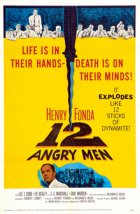
12 Angry Men Page #8
NO. 3:
(loud). Well, what are you looking at?[They turn away. He goes back to his seat now. Silently the rest of the jurors take their seats. NO. 12 begins to
doodle. NO. 10 blows his nose, but no one speaks. Then, finally…
NO. 4:
I don't see why we have to behave like children here.NO. 11:
Nor do 1. We have a responsibility. This is a remarkable thing about democracy. That weare…ummmm… what is the word…Ah, notified! That we are notified by mail to come down to this place and
decide on the guilt or innocence of a man we have not known before. We have nothing to gain or lose by our
verdict. This is one of the reasons why we are strong. We should not make it a personal thing.
: Nor do 1. We have a responsibility. This is a remarkable thing about democracy. That we
are…ummmm… what is the word…Ah, notified! That we are notified by mail to come down to this place and
decide on the guilt or innocence of a man we have not known before. We have nothing to gain or lose by our
verdict. This is one of the reasons why we are strong. We should not make it a personal thing.
[There is a long, awkward pause.]
NO. 12:
Well—we're still nowhere. Who's got an idea?NO. 6:
I think maybe we should try another vote. Mr. Foreman?FOREMAN:
It's all right with me. Anybody doesn't want to vote?NO. 7:
All right, let's do it.NO. 3:
I want an open ballot. Let's call out our votes. I want to know who stands where.FOREMAN:
That sounds fair. Anyone object? (No one does.) All right. I’ll call off your jury numbers.[He takes a pencil and paper and makes marks now in one of two columns after each vote.]
FOREMAN:
I vote guilty. NO. 2?NO. 2:
Not guilty.FOREMAN:
NO. 3?NO. 3:
Guilty.FOREMAN:
NO. 4?NO. 4:
Guilty.FOREMAN:
NO. 5?NO. 5:
Not guilty.FOREMAN:
NO. 6?NO. 6:
Not guilty.FOREMAN:
NO. 7?NO. 7:
Guilty.FOREMAN:
NO. 8?NO.8:
Not guilty.FOREMAN:
NO. 9: NO. 9?NO.9:
Not guilty. .FOREMAN:
NO. 10?NO. 10:
Guilty.FOREMAN:
NO.11?NO.11:
Not guilty.FOREMAN:
NO. 12?NO.12:
Guilty.NO.4:
Six to six.NO.10 (mad) I’ll tell you something. The crime is being committed right in this room.
FOREMAN:
The vote is six to six.NO. 3:
I'm ready to walk into court right now and declare a hung jury. There's no point in this going on anymore.
NO. 7:
I go for that, too. Let's take it in to the judge and let the kid take his chances with twelve other guys.NO. 5:
(to NO. 7). You mean you still don't think there's room for reasonable doubt?NO. 7:
No, I don't.NO. 11:
I beg your pardon. Maybe you don't understand the term "reasonable doubt.”NO. 7:
(angry). What do you mean I don't understand it? Who do you think you are to talk to me like that? (Toall) How do you like this guy? He comes over here running for his life, and before he can even take a big breath
he's telling us how to run the show. The arrogance of him!
NO. 5:
(to NO. 7). Wait a second. Nobody around here's asking where you came from.NO. 7:
I was born right here.NO. 5:
Or where your father came from. (He looks at NO. 7, who doesn't answer but looks away.) Maybe itwouldn't hurt us to take a few tips from people who come running here! Maybe they learned something we don't
know. We're not so perfect!
NO. 11:
Please—I am used to this. It's all right. Thank you.NO.5:
It's not all right!NO. 7:
Okay, okay, I apologize. Is that what you want?NO. 5:
That's what I want: That's what I want.FOREMAN:
All right. Let's stop the arguing. Who's got something constructive to say?NO.2:
(hesitantly). Well, something's been bothering me a little . . . this whole business about the stab woundand how it was made, the downward angle of it, you know?
NO. 3:
Don't tell me we're gonna start that. They went over it and over it in court.NO. 2:
I know they did—but I don't go along with it. The boy is five feet eight inches tall. His father was sixtwo. That's a difference of six inches. It's a very awkward thing to stab down into the chest of someone who's
half a foot taller than you are.
[NO. 3 jumps up, holding the knife.]
NO. 3:
Look, you're not going to be satisfied till you see it again. I'm going to give you a demonstration.Somebody get up.
[He looks around the table. NO. 8 stands up and walks toward him. NO. 3 closes the knife and puts it in his
pocket. They stand face to face and look at each other for a moment.]
NO. 3:
Okay. (To NO. 2) Now watch this. I don't want to have to do it again. (He crouches down now until he isquite a bit shorter than NO. 8) Is that six inches?
NO. 12:
That's more than six inches.NO. 3:
Okay, let it be more.[He reaches into his pocket and takes out the knife. He flicks it open, changes its position in his hand, and holds
the knife aloft, ready to stab. He and NO. 8 look steadily into each other's eyes. Then he stabs downward,
hard.]
NO. 2:
(shouting). Look out![He stops short just as the blade reaches NO. 8's chest. NO. 3 laughs]
NO. 6:
That's not funny.NO. 5:
What's the matter with you?NO. 3:
Now just calm down. Nobody's hurt, are they?NO. 8:
(low). No, nobody's hurt.NO. 3:
All right. There's your angle. Take a look at it. Down and in. That's how I'd stab a taller man in thechest, and that's how it was done. Take a look at it and tell me I'm wrong.
[NO. 2 doesn't answer. NO. 3 looks at him for a moment, then jams the knife into the table and sits down. They
all look at the knife.]
NO. 6:
Down and in. I guess there's no argument.[NO. 8 picks the knife out of the table and closes it. He flicks it open, and changing its position in his handNO. 8 picks the knife out of the table and closes it. He flicks it open, and changing its position in his hand,
stabs downward with it.]
NO. 8:
(to NO. 6). Did you ever stab a man?NO. 6:
Of course not.NO. 8:
(to NO. 3). Did you?NO. 3:
All right, let's not be silly.NO. 8:
Did you?NO. 3:
(loudly). No, I didn't!NO. 8:
Where do you get all your information about how it's done?NO. 3:
What do you mean? It's just common sense.NO. 8:
Have you ever seen a man stabbed?NO. 3:
(pauses and looks around the room nervously) No.NO. 8:
All right. I want to ask you something. The boy was an experienced knife fighter. He was even sent toreform school for knifing someone, isn't that so?
NO. 12:
That's right.NO. 8:
Look at this. (NO.8 closes the knife, flicks it open, and changes the position of the knife so that he canstab over-handed.) Doesn't it seem like an awkward way to handle a knife?
NO. 3:
What are you asking me for?[NO. 8 closes the blade and flicks it open, holds it ready to slash underhanded.]
NO. 5:
Wait a minute! What's the matter with me? Give me that.[He reaches out for the knife.]
NO. 8:
Have you ever seen a knife fight?NO. 5:
Yes, I have.NO. 8:
In the movies?NO. 5:
In my back yard, on my stoop, in the vacant lot across the street, too many of them. Switch knives camewith the neighborhood where I lived. Funny I didn't think of it before. I guess you try to forget those things.
(Flicking the knife open) Anyone who's ever used a switch knife would never have stabbed downward. You
don't handle a switch knife that way. You use it underhanded.
Translation
Translate and read this script in other languages:
Select another language:
- - Select -
- 简体中文 (Chinese - Simplified)
- 繁體中文 (Chinese - Traditional)
- Español (Spanish)
- Esperanto (Esperanto)
- 日本語 (Japanese)
- Português (Portuguese)
- Deutsch (German)
- العربية (Arabic)
- Français (French)
- Русский (Russian)
- ಕನ್ನಡ (Kannada)
- 한국어 (Korean)
- עברית (Hebrew)
- Gaeilge (Irish)
- Українська (Ukrainian)
- اردو (Urdu)
- Magyar (Hungarian)
- मानक हिन्दी (Hindi)
- Indonesia (Indonesian)
- Italiano (Italian)
- தமிழ் (Tamil)
- Türkçe (Turkish)
- తెలుగు (Telugu)
- ภาษาไทย (Thai)
- Tiếng Việt (Vietnamese)
- Čeština (Czech)
- Polski (Polish)
- Bahasa Indonesia (Indonesian)
- Românește (Romanian)
- Nederlands (Dutch)
- Ελληνικά (Greek)
- Latinum (Latin)
- Svenska (Swedish)
- Dansk (Danish)
- Suomi (Finnish)
- فارسی (Persian)
- ייִדיש (Yiddish)
- հայերեն (Armenian)
- Norsk (Norwegian)
- English (English)
Citation
Use the citation below to add this screenplay to your bibliography:
Style:MLAChicagoAPA
"12 Angry Men" Scripts.com. STANDS4 LLC, 2025. Web. 23 Jan. 2025. <https://www.scripts.com/script/12_angry_men_58>.







Discuss this script with the community:
Report Comment
We're doing our best to make sure our content is useful, accurate and safe.
If by any chance you spot an inappropriate comment while navigating through our website please use this form to let us know, and we'll take care of it shortly.
Attachment
You need to be logged in to favorite.
Log In